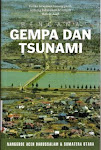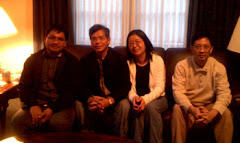10 years on, Indonesia's rape riots denied but not forgotten
Tuesday, May 13, 2008
Presi Mandari
JAKARTA - Agence France-Presse
http://www.turkishdailynews.com.tr/article.php?enewsid=104298
As Indonesians prepare to mark the 10th anniversary of the fall of the Suharto regime this month, the terrible first act of that historic drama is almost too shameful to recall.
Except, of course, for the country's ethnic Chinese minority, which bore the brunt of two days of rioting, rape and arson on May 13-14, 1998 that signaled the beginning of the end of the general's dictatorship.
The riots left more than 1,000 people dead and forced ethnic Chinese women to cower in their homes for days as rape squads -- purportedly led by army thugs -- roamed Jakarta's streets.
"It was terrifying chaos. People were trapped inside the burning department stores and black smoke was everywhere from the burning buildings and vehicles on the streets," Yuyun, an ethnic Chinese woman, told AFP in the city's Chinatown district.
Hundreds of Chinese-owned homes and businesses were looted and razed during the unrest, which unfolded under the noses of the security forces. Their failure to intervene has fuelled suspicions of military involvement ever since.
If the army's goal was to reimpose its authority as the country reeled from the shocks of the Asian financial crisis, it failed. Instead, the violence heralded the end of Suharto's 32-year rule less than 10 days later.
A lot has changed in Jakarta since those days. The city is enthusiastically democratic, the economy is back on its feet and all the properties damaged and burned in the riots have been rebuilt.
But memories of the gang rapes still haunt the victims, even if most residents would prefer to forget the violence ever happened.
"My aunt phoned us and told us to turn off all lights at home so that the attackers would think nobody was home. We heard that many Chinese women became victims of gang rape," said another ethnic Chinese woman, Tinawati.
She said she hid at home with her mother without turning on the lights for a week before they had the courage to go outside.
"At that time I always brought an Islamic veil with me. People told me that kind of trick worked to save Chinese women from attackers," she said.
After Suharto's ouster a fact-finding mission set up by the new president, B.J. Habibie, found that nearly 100 mostly ethnic Chinese women had been gang-raped or sexually assaulted during the unrest.
It found that there was no conclusive evidence of military involvement, but named Suharto's son-in-law, lieutenant-general Prabowo, and the army's then-chief for Jakarta, major-general Syafrie Syamsoeddin, as people of interest for further investigations.
However, the prevalent culture of impunity meant neither Prabowo nor Syamsoeddin were investigated and no one was charged over the violence.
A UN special rapporteur who probed the unrest condemned the lack of action and called for all those behind the attacks to be punished.
"Otherwise, the legitimate process of politics and governance will always be subverted by shadowy forces who rule civil society through the use of terror," the rapporteur said in her report.
National Commission on Women's Rights chief Kemala Chandra Kirana said there were still those in Jakarta who denied that any rapes took place.
"There was no debate or argument about the number of victims trapped inside the burning buildings. But people doubted whether the gang rapes really happened," she told AFP.
"There is a denial of such incidents not only by those in power but also by ordinary people," she said.
Sandyawan Sumardi, a priest and activist who has counseled some of the victims, is angry at the number of times high-ranking officials and even ordinary people have asked what evidence he has that women were raped.
"I ask them one question. If one of your family members was a victim, would you want her to testify in public?" Sumardi asked, adding that victims and rights activists had received anonymous threats telling them to shut up.
"We want to explain to the international community that the 1998 riot wasn't the result of ethnic tensions between indigenous people and those of Chinese descent. It was a military operation," he said.
"It was a military operation launched by those who wanted to maintain their power in Indonesia."
Back in Chinatown, Yuyun said she felt no animosity from indigenous Indonesians.
"The Chinese people have long been united with indigenous Indonesians here in Chinatown. People from all races are basically the same. There's no difference at all," Yuyun said.
"I heard and believe that the riots were perpetrated by the military. They were extremely cruel. I don't think that ordinary people could be that barbaric." ***
Tuesday, May 13, 2008
Presi Mandari
JAKARTA - Agence France-Presse
http://www.turkishdailynews.com.tr/article.php?enewsid=104298
As Indonesians prepare to mark the 10th anniversary of the fall of the Suharto regime this month, the terrible first act of that historic drama is almost too shameful to recall.
Except, of course, for the country's ethnic Chinese minority, which bore the brunt of two days of rioting, rape and arson on May 13-14, 1998 that signaled the beginning of the end of the general's dictatorship.
The riots left more than 1,000 people dead and forced ethnic Chinese women to cower in their homes for days as rape squads -- purportedly led by army thugs -- roamed Jakarta's streets.
"It was terrifying chaos. People were trapped inside the burning department stores and black smoke was everywhere from the burning buildings and vehicles on the streets," Yuyun, an ethnic Chinese woman, told AFP in the city's Chinatown district.
Hundreds of Chinese-owned homes and businesses were looted and razed during the unrest, which unfolded under the noses of the security forces. Their failure to intervene has fuelled suspicions of military involvement ever since.
If the army's goal was to reimpose its authority as the country reeled from the shocks of the Asian financial crisis, it failed. Instead, the violence heralded the end of Suharto's 32-year rule less than 10 days later.
A lot has changed in Jakarta since those days. The city is enthusiastically democratic, the economy is back on its feet and all the properties damaged and burned in the riots have been rebuilt.
But memories of the gang rapes still haunt the victims, even if most residents would prefer to forget the violence ever happened.
"My aunt phoned us and told us to turn off all lights at home so that the attackers would think nobody was home. We heard that many Chinese women became victims of gang rape," said another ethnic Chinese woman, Tinawati.
She said she hid at home with her mother without turning on the lights for a week before they had the courage to go outside.
"At that time I always brought an Islamic veil with me. People told me that kind of trick worked to save Chinese women from attackers," she said.
After Suharto's ouster a fact-finding mission set up by the new president, B.J. Habibie, found that nearly 100 mostly ethnic Chinese women had been gang-raped or sexually assaulted during the unrest.
It found that there was no conclusive evidence of military involvement, but named Suharto's son-in-law, lieutenant-general Prabowo, and the army's then-chief for Jakarta, major-general Syafrie Syamsoeddin, as people of interest for further investigations.
However, the prevalent culture of impunity meant neither Prabowo nor Syamsoeddin were investigated and no one was charged over the violence.
A UN special rapporteur who probed the unrest condemned the lack of action and called for all those behind the attacks to be punished.
"Otherwise, the legitimate process of politics and governance will always be subverted by shadowy forces who rule civil society through the use of terror," the rapporteur said in her report.
National Commission on Women's Rights chief Kemala Chandra Kirana said there were still those in Jakarta who denied that any rapes took place.
"There was no debate or argument about the number of victims trapped inside the burning buildings. But people doubted whether the gang rapes really happened," she told AFP.
"There is a denial of such incidents not only by those in power but also by ordinary people," she said.
Sandyawan Sumardi, a priest and activist who has counseled some of the victims, is angry at the number of times high-ranking officials and even ordinary people have asked what evidence he has that women were raped.
"I ask them one question. If one of your family members was a victim, would you want her to testify in public?" Sumardi asked, adding that victims and rights activists had received anonymous threats telling them to shut up.
"We want to explain to the international community that the 1998 riot wasn't the result of ethnic tensions between indigenous people and those of Chinese descent. It was a military operation," he said.
"It was a military operation launched by those who wanted to maintain their power in Indonesia."
Back in Chinatown, Yuyun said she felt no animosity from indigenous Indonesians.
"The Chinese people have long been united with indigenous Indonesians here in Chinatown. People from all races are basically the same. There's no difference at all," Yuyun said.
"I heard and believe that the riots were perpetrated by the military. They were extremely cruel. I don't think that ordinary people could be that barbaric." ***




















No comments:
Post a Comment